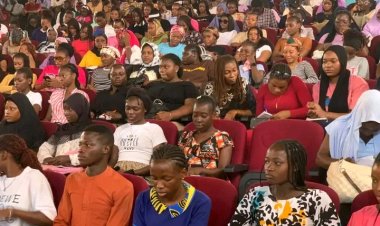UK University Payments from Nigerian Students Drop 65% Amid Economic Challenges
A recent report by the Financial Times of London has revealed a sharp decline in payments from Nigerian students for the upcoming academic session at UK universities, with a 65% drop compared to last year.

A recent report by the Financial Times of London has revealed a sharp decline in payments from Nigerian students for the upcoming academic session at UK universities, with a 65% drop compared to last year. The ongoing economic challenges in Nigeria have significantly impacted international education funding, leading to this steep decline.
The report also highlighted a 44% drop in payments by students from India, another major contributor to the League of International Students in the United Kingdom. These two nations, among the top three sources of international students in the UK, have seen substantial decreases in deposits for university courses.
According to data from Enroly, a web platform used by one in three international students for managing enrollment, there was an overall 35% drop in deposits for places at UK universities this month compared to August 2023. Paul Kett, a senior education and skills adviser at PwC UK, warned that some universities might need to take significant actions to ensure their financial sustainability.
Despite a slight recovery in applications this month, the number of international students applying to UK universities remains far below recent levels. This decline has left some institutions facing financial crises, although there has been a minor improvement since May, when the drop was 57% compared to the previous year.
The Education Secretary, Bridget Phillipson, recently expressed the new Labour government's commitment to welcoming international students, criticizing the negative rhetoric of the previous Conservative administration. This change in tone is seen as a positive step, but the data still shows a significant decline in student numbers from Nigeria and India.
Interestingly, smaller markets like Kenya and Nepal have shown increased demand compared to last year. Jeffrey Williams, Chief Executive of Enroly, noted that early signs of recovery could be attributed to efforts by the new government to stabilize immigration policy and concerns over the potential elimination of the postgraduate work visa being assuaged.
However, Harry Anderson, Deputy Director of Universities UK International, emphasized that the international environment remains volatile for universities. The sector continues to face challenges, particularly with the Labour government retaining the Conservative’s ban on most graduate students bringing family members, a policy that could affect the competitiveness of UK institutions.
The Office for Students (OfS), the regulator, has started preparing for a potential wave of university insolvencies, advertising a contract worth up to £4 million for professional services companies to handle restructuring programs. This move follows financial accounts revealing overly optimistic projections about the growth of overseas recruitment in the coming years.
Meanwhile, data from the Central Bank of Nigeria’s balance of payment compilation for the first six months of 2023 shows that Nigerians spent $896.09 million on foreign education, with a significant portion going to the UK. With foundation courses in the UK costing between £10,000 and £15,000 and additional yearly expenses of around £8,000, the financial burden on Nigerian students has become increasingly challenging amid the country’s economic struggles.

 Lois Udoye
Lois Udoye 



